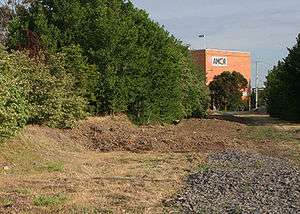APM Siding
APM Siding | |
|---|---|
 Looking south-east along the dismantled siding, towards the paper mill | |
| Coordinates | 37°46′51″S 145°01′26″E / 37.78083°S 145.02389°ECoordinates: 37°46′51″S 145°01′26″E / 37.78083°S 145.02389°E |
| Line(s) | Outer Circle |
| Tracks | Dismantled |
| History | |
| Opened | 29 July 1919 |
| Closed | 1994 (?) |
The APM Siding was a 1.125-kilometre (0.7 mi) long private railway siding in the suburb of Alphington, Melbourne, Australia, that served the Australian Paper Manufacturers paper mill (later becoming the Amcor Fibre Packaging, before being closed in 2012). The siding branched from Fairfield station, on the Hurstbridge line, and ran south-east to the corner of Chandler Highway, Grange and Heidelberg Roads, until entering the factory.
History
The line past the factory was opened on 24 March 1891, as the Outer Circle line,[1] but the paper mill itself did not exist at this time. This section of the line was closed on 12 April 1893.[1] It was not until 29 July 1919, that the line from Fairfield was reopened to the paper mill, and new sidings opened to serve it.[2] From the Heidelberg Road - Chandler Highway intersection, the track left the alignment of the former Outer Circle railway, and slewed east into the mill itself. Once inside the factory, the siding spread into three branches: the east was used to unload paper pulp, the centre siding for unloading of coal wagons, and the western one being the longest running, almost to the mill's southern fence.
Electrification of the siding was provided in the 1950s, at the same time as that on the Gippsland line to Traralgon, with the overhead on the siding removed by June 1988,[3] except for a short section, long enough for a six-car suburban train at the junction.[2] In April 1994, V/Line announced that the mill would no longer have a need for siding, with it being booked out soon after.[2] Contributing factors included the demise of coal traffic, and changes at the paper mill, meaning pulp would need to be double handled in the factory itself.
The rail was removed in 2003–2004, and ended up at the Yarra Valley Tourist Railway, with all overhead wiring on the siding gone by this time.[4] A dwarf signal and overhead wiring stanchions remain in the paper mill grounds themselves.[5] The paper mill was closed in 2012.[6]
Traffic
Until the boilers at the paper mill were converted to gas firing, 400 tonnes (440 short tons) of coal per day was transferred in two trains per day, from the company owned Maddingley brown coal mine, on the outskirts of Bacchus Marsh.[2] Wagons were unloaded by hand, until a wagon tippler was provided in 1951.[2]
Paper pulp was also transferred from the company Maryvale mill (near Traralgon), first by steam locomotives, then after electrification of the Gippsland line, by E and L class electric locomotives, along with B and T class diesels. In later years, T and P classes worked the siding, with VOBX or VFNX wagons loaded with white paper in cubed form entering the siding and empty wagons out.[4]
-

Intersection of Grange and Heidelberg Road, line towards Fairfield is in the background. The paper mill is behind the photographer.
-

Looking into the paper mill itself from the Heidelberg Road intersection
-

Junction of the siding (to the right) and the Hurstbridge line, looking away from the city towards the mill
References
- 1 2 David Beardsell and Bruce Herbert (1979). The Outer Circle: A history of the Oakleigh to Fairfield Park Railway. Australian Railway Historical Society (Victorian Division). ISBN 0-85849-024-2.
- 1 2 3 4 5 S Cauchi (November 1994). "Closure of the Australian Paper Ltd siding at Fairfield". Newsrail. Australian Railway Historical Society (Victorian Division). pp. 328–331.
- ↑ "Works". Newsrail. Australian Railway Historical Society. August 1988. p. 252.
- 1 2 "APM siding across the Grange Road/Heidelberg Rd - Railpage Australia Forums (Melbourne suburban)". www.railpage.com.au. Retrieved 2008-03-25.
- ↑ "Where is it ~ Melbourne Suburban (Photo) #3 - Railpage Australia Forums (Melbourne suburban)". www.railpage.com.au. Retrieved 2008-03-25.
- ↑ "Former Amcor Mill - Conservation Management Plan". Lovell Chen. Retrieved 2015-12-03.
External links
- Railpage Australia - The APM Fairfield Siding with Photos and References
- Photo: L class electric locomotive at the siding in 1984
- Map: Melway 1966 edition, map 31
- Map: Today
- History of APM mill: Former Amcor Mill - Conservation Management Plan
| Closed station navigation | ||||
|---|---|---|---|---|
| Outer Circle line | ||||
| ← Previous station | Fulham Grange | | | Willsmere | Next station → |
| Closed stations | ||||